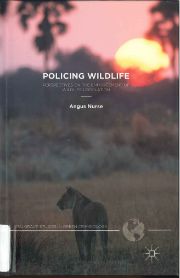Results
Displaying 61 - 70 of 6638
| Title | Citation | Alternate Citation | Agency Citation | Summary | Type |
|---|---|---|---|---|---|
| KS - Cruelty - Consolidated Cruelty and Animal Fighting Laws | K. S. A. 21-6411 - 6418; 21-5504; 60-5401 | KS ST 21-6411 - 6418; 21-5504; 60-5401 | The Kansas anti-cruelty statutes define cruelty to animals as knowingly killing, injuring, maiming, torturing, burning or mutilating any animal. Also included as cruelty are abandoning any animal, failing to provide food, horse-tripping, and poisoning any domestic animal, unlawful disposition of animals, dog and cock-fighting. Cruelty to animals may be a misdemeanor or a felony. Exceptions are made for such things as veterinary practices, research experiments, rodeo and farming practices, euthanasia, and pest control. It is also illegal to allow a dangerous animal to run at large or to engage in sodomy with an animal. | Statute | |
| CT - Feral Cats - § 22-339d. Municipal control of feral cats | C.G.S.A. § 22-339d | CT ST § 22-339d | This Connecticut statute permits municipalities to adopt ordinances requiring registration of feral cat "keepers," defined as anyone who harbors or regularly feeds a feral cat. If a municipality enacts such an ordinance, the ordinance must require the keeper to sterilize the cat and have it vaccinated against rabies. The statute also enables municipalities to adopt ordinances holding cat owners and keepers responsible if their cats cause significant property damage or severe health violations. | Statute | |
| City of Delray Beach v. St. Juste | 989 So.2d 655 (Fla.App. 4 Dist. 2008) | 2008 WL 2261598 (Fla.App. 4 Dist.), 33 Fla. L. Weekly D1456 | In this Florida case, the city of Delray Beach appealed from a judgment for damages in favor of appellee plaintiff, who was injured by two loose dogs. The theory of liability was based on the city's knowledge, from prior complaints, that these dogs were loose from time to time and dangerous. The plaintiff suggested that the city's failure to impound the dogs after prior numerous complaints contributed to the attack. The court concluded that decisions made by the city's animal control officer and police to not impound the dogs were discretionary decisions, and therefore the city was immune. | Case | |
| National Meat Ass'n v. Harris | 32 S.Ct. 965 (2012) | 2012 WL 171119 (U.S.) |
Trade association representing packers and processors of swine livestock and pork products sued the State of California for declaratory and injunctive relief barring a ban on slaughter and inhumane handling of nonambulatory animals on federally regulated swine slaughterhouses. The Supreme Court held that the Federal Meat Inspection Act (FMIA) preempted the California Penal Code provision prohibiting the sale of meat or meat product of “nonambulatory” animals for human consumption and requiring immediate euthanization of nonambulatory animals. |
Case | |
| Animal & Natural Resource Law Review Volume XIX |
Published by the students of Michigan State University College of LawAnimal & Natural Resource Law ReviewVol. |
Policy | |||
| AR - Hunting, remote - 002.00.1-05.08. Prohibited Methods for Hunting Wildlife | AR ADC 002.00.1-05.08 | Ark. Admin. Code 002.00.1-05.08 | This Arkansas regulation prohibits computer-assisted hunting, among other activities. | Administrative | |
| Policing Wildlife |
|
Policy | |||
| Research/Animal Testing | Policy | ||||
| GA - Ecoterrorism - Article 2. Georgia Farm Animal, Crop, and Research Facilities Protection Act | Ga. Code Ann., § 4-11-30 to 35 | GA ST § 4-11-30 to 35 | This article is known as the Georgia Farm Animal, Crop, and Research Facilities Protection Act. A person commits an offense if, without the consent of the owner, the person acquires or otherwise exercises control over an animal facility, an animal from an animal facility, or other property from an animal facility with the intent to deprive the owner of such facility, animal, or property and to disrupt or damage the enterprise conducted at the animal facility. Other prohibited actions also include gaining entry where a person knows entry is forbidden. In the definition of "consent," the act states that the term does not include assent that is induced by force, threat, false pretenses or fraud. It also excludes assent given by a person that the actor knows is not authorized by the owner, or given by a person who the actor knows is unable to make reasonable decisions (e.g., because of youth, intoxication, or mental disease or defect). Violations that involve exercising control over a facility are felonies; those that involve illegal entry or damage less than $500 are misdemeanors. | Statute | |
| CA - Hunting - Chapter 4. Deer. Article 2. License Tags | West's Ann. Cal. Fish & G. Code § 4330 - 4341 | CA FISH & G § 4330 - 4341 | These provisions relate to the license requirements for deer hunting for both residents and nonresidents of California. For example, the holder of a deer tag license shall carry the tag while hunting deer, and upon the killing of any deer, shall immediately fill out the tag and permanently mark the date of the kill. The deer tag shall be immediately attached to the antlers of antlered deer or to the ear of any other deer and kept attached during the open season and for 15 days thereafter. | Statute |
